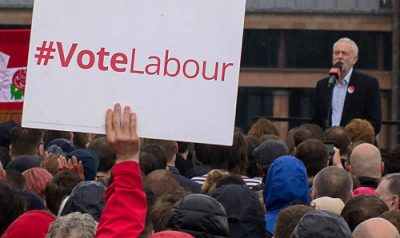British Labour’s Fractious Jaunt: The Politics of the Independent Group

They could not hold on. A small – and in the scheme of things negligible group – split from the British Labour mothership last month in an effort to salvage some self-described form of credibility. In truth, they were the original sceptics of Jeremy Corbyn, the pro-New Labour grouping indifferent, even disbelieving, about the predations made by Tony Blair during his reign. Thinking that he would remain on both backbench and in museum, a historical relic of Labour values supposedly done away with under Blair’s rule of spinning and cunning, some even put Corbyn up for the Labour leadership. As things transpired, the tired technocrats, focus groupies, and a range of other associates of Tone’s worldview were given a rude shock with the ascendancy of Corbyn and Momentum.
The split, comprising Chris Leslie, Luciana Berger, Ann Coffey, Chuka Umunna, Mike Gapes, Angela Smith and Gavin Shuker, should have happened sooner. But times are good to make shallow decisions short on policy but noisy with neglected values. Britain remains chaotically disposed and unruly; its Prime Minister remains desperate and hoping for an extension on negotiations regarding an exit from the European Union. Papers associated with the left of British politics were chewing over the decision to form a new grouping. The resignations, claimed the Guardian, “are a mistake, but they are also a warning. Like it or not, and a few on all wings have always disliked it, the Labour party is not a centralist party.”
Chris Leslie used the familiar themes of hostage taking that have come to symbolise the divide in Britain’s left. “The Labour Party we joined, what we campaigned for and believed in is no longer today’s Labour Party… it has now been hijacked by the machine politics of the hard left.” Labour had betrayed Europe and enabled, according to Leslie, the conditions for May’s Brexit to take place. The “public” had been denied “a final say”. (Matters of the public are relative: the public did have a say in 2016, but a narrative that is digging its way into the books is that it was illegitimate, stolen, an act of grand and cruel deception, ergo invalid.)
Berger felt “embarrassed” at her party, claiming that its values of equality had been “undermined and attacked.” For her, the movement had mutated, fed by “a culture of bullying, bigotry and intimidation.”
The Independent Group, as they have termed themselves, have also been swelled by three Tory recruits, a point which made the Financial Times exaggerate its significance (no less than “the fifth largest bloc in the House of Commons”!). In a sense, they were merely peelers from the periphery, and fairly flip-floppy on that score. All have now reached the conclusion that Brexit is a bad idea, wish for a second referendum to reverse the rot and loathe the Eurosceptic grouping within their party. Amongst the three, though, are curious streaks of variation. Sarah Wollaston had embraced the Eurosceptic stance but felt troubled by the claim from Brexit campaigners that leaving the EU would result in £350m being put into the National Health Service. Heidi Allen, by way of contrast, was always a Remain supporter.
The language of departure, and of being left behind, is standard political fare. Anna Soubry spoke about not leaving the Conservative Party; it was her party, rather, that had left her. And so Tom Crewe reminds us in the London Review of Books of Joseph Chamberlain when he founded the Liberal Unionist Party in an act of defection in 1886: “We are liberals and unchanged, even though our leader has deserted us.” The issue then for the Liberals was Home Rule for Ireland; the Liberal Unionists went on to get 77 MPs elected.
If Labour does succumb to a cathartic slaughter, these are things best done in collective drubbings. There is not yet the feeling that this could be another “Gang of Four” moment that led to the formation of the SDP in the 1981, along with the gathering of 35 MPs into its ranks.
And Corbyn’s popularity remains undervalued and hard to estimate in any polling performance, even if he has not acted, in decisive terms, as a fully engaged and constructive opposition leader. Like other political phenomena who have managed to burst through the conventional tedium of statistical prediction and dull projection, he not only survived but came through mightily at the last general election. This served to show the sheer divisions present in British politics. The Independent Group, as has been pointed out by Rod Liddle, cannot merely survive on anti-Corbyn mania. At some point, it will have to come through with a few ideas to hang on a hook or two.
Anti-party parties eventually have that perennial habit of becoming another political movement that will either sink, float or be absorbed. In this case, the obvious disruption to the Independent Group will come from Vince Cable’s Liberal Democrats, who are currently polling at 7 percent. The question to ask in 2019, poses Crew, “is not whether a ‘centre’ exists but whether political circumstances have once again made ‘centrism’ a viable political strategy.”
*
Note to readers: please click the share buttons below. Forward this article to your email lists. Crosspost on your blog site, internet forums. etc.
Dr. Binoy Kampmark was a Commonwealth Scholar at Selwyn College, Cambridge. He lectures at RMIT University, Melbourne. He is a frequent contributor to Global Research and Asia-Pacific Research. Email: [email protected]
Featured image is from Red Pepper

